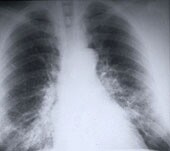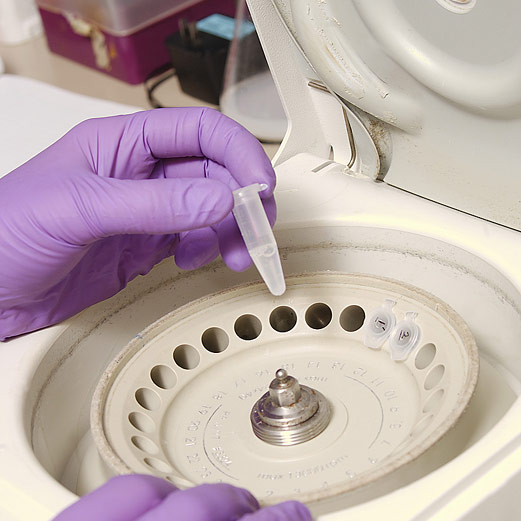
SATURDAY, June 5 (HealthDay News) — Researchers report they prolonged survival for some patients with advanced non-small cell lung cancer, for whom the median survival is currently only about six months.
One study discovered that an experimental drug called crizotinib shrank tumors in the majority of lung cancer patients with a specific gene variant. An estimated 4 percent of lung cancer patients, or roughly 40,000 people worldwide, have this gene variant.
A second study found that a double-chemotherapy regimen benefited elderly patients, who represent the majority of those with lung cancer worldwide. Roughly 100,000 patients with lung cancer in the United States are over the age of 70.
“This is our toughest cancer in many ways,” said Dr. Mark Kris, moderator of a Saturday press conference at the annual meeting of the American Society of Clinical Oncology (ASCO), in Chicago. “It affects 220,000 Americans each year, and over a million people worldwide. Sadly, it is our nation’s — and our world’s — leading cancer.”
The first study, a phase 1 trial, found that 87 percent of 82 patients with advanced non-small cell lung cancer with a specific mutation of the ALK gene, which makes that gene fuse with another, responded robustly to treatment with crizotinib, which is made by Pfizer Inc.
“The patients were treated for an average of six months, and more than 90 percent saw their tumors shrink in size and 72 percent of participants remained progression-free six months after treatment,” said study author Dr. Yung-Jue Bang, a professor in the department of internal medicine at Seoul National University College of Medicine in South Korea. Ordinarily, only about 10 percent of patients would be expected to respond to treatment.
About half of patients experienced nausea, vomiting and diarrhea but these side effects eased over time, Bang said.
The fusion gene was first discovered to play a role in this type of lung cancer in 2007. Researchers are now working on a phase 3 trial of the drug. The Korean researchers reported financial ties to Pfizer.
“We didn’t even know this [the fusion gene] could cause lung cancer in 2006, and now we’re moving to phase 3 trials and likely pretty quick approval of this drug,” said Dr. Karen Reckamp, an assistant professor of medicine in the thoracic oncology program at City of Hope Cancer Center in Duarte, Calif. “So, although it’s only 4 percent of patients it’s still a good proportion and it will affect many lives in a significant and positive way.”
“Although this is a small proportion of the entire lung cancer population, for the few patients who have this oncogene, the drug represents enormous progress,” said Dr. Deepa Subramaniam, director of the brain tumor center at Lombardi Comprehensive Cancer Center at Georgetown University, in Washington, D.C.
Because the drug is not yet approved, testing for the gene is only available through a central lab run by Abbott Diagnostics. “Typically, testing is only done for patients who are potentially eligible for clinical trials,” she said. “Once the drug is approved, testing should become more easily available.”
The second study, a phase 3 trial, involved 451 patients with advanced non-small cell lung cancer aged 70 to 89. The study had first expected to enroll 520 patients, but it was halted early when good survival results were seen in the group taking the combination therapy.
Currently, elderly patients are typically given just one chemotherapy drug, with younger patients more likely to get two or more.
“The elderly have been very understudied in lung cancer studies, despite the fact that the median age for getting lung cancer is about 70. The median age for most trials is well under that,” said Reckamp. “This is the first randomized trial in patients aged 70 to almost 90.”
Previous studies had been mixed and had serious side effects, she added. “There is definitely increased toxicity, but [this study shows] it is probably manageable in most patients.”
In this trial, participants were randomly selected to receive either one chemotherapy agent — gemcitabine (Gemzar) or vinorelbine (Navelbine) — or to receive both carboplatin and paclitaxel (Taxol).
For the single-agent group, median survival at one year was 6.2 months and 27 percent patients were still alive, “which is consistent with previous research,” said study author Dr. Elisabeth Quoix, a professor of medicine at University Hospital in Strasbourg, France.
“In the double-therapy group, the median survival increased by four months [to 10.3 months], which is quite unusual in thoracic oncology,” Quoix said. “Forty-five percent of patients survived one year, which is also quite unusual.”
“The four-month improvement is a huge one,” added Kris, who is chief of thoracic oncology at Memorial Sloan-Kettering Cancer Center in New York City. “Other large clinical trials … have generally felt to be practice-changing with a two-month change in median survival. This trial supports the idea that patients over 70 should be treated just as anyone else.”
“I don’t think this will result in an immediate change in practice,” said Subramaniam. “This reinforces the fact that physiological age matters as much as chronological age.”
Quoix and other study authors reported ties with different pharmaceutical companies, including Eli Lilly Co. and Roche Inc.
Finally, a phase 3 study out of the University of Texas M.D. Anderson Cancer Center in Houston found patients receiving the targeted drug vandetanib combined with chemotherapy had a 21 percent decline in disease progression compared to those receiving chemotherapy alone. Median progression-free survival in the combination arm was 17.3 weeks vs. 14 weeks in the control group.
This study was simultaneously presented Saturday at the ASCO meeting and published in The Lancet Oncology.
Kris also reported ties with several pharmaceutical firms.
More information
The U.S. National Cancer Institute has more on lung cancer.

